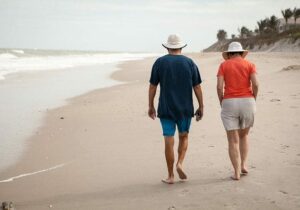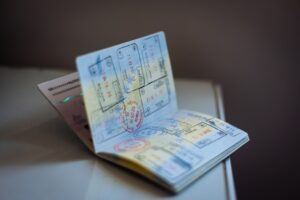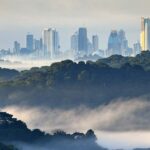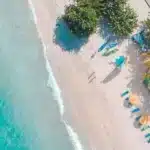The Malta Retirement Programme (MRP) allows retirees from both inside and outside the EU, EEA, and Switzerland to live in Malta with tax benefits. To qualify, applicants must rent or buy property that meets set price limits, have health insurance covering Malta and the EU, and show financial stability. Those in the program pay a 15% tax on foreign pension income sent to Malta, with a minimum yearly tax of €7,500.
Malta offers retirees the opportunity to live in a country with a warm climate, beautiful views, and a rich history. Additionally, Malta’s location in the Mediterranean makes it easy to explore other European destinations.
This guide will cover everything you need to know about the program, including the minimum value for the property requirements, tax rules, and how to apply.
- What is the Malta Retirement Programme?
- Benefits of the Malta Retirement Program
- What are the Malta Retirement Visa requirements?
- Required Documents for the Malta Retirement Program
- Malta Retirement Visa Application Process
- How long is the application process for the Malta Retirement Programme?
- Malta’s Special Tax Regime
What is the Malta Retirement Programme?

To qualify, applicants must buy property worth at least €275,000 in Malta or €220,000 in Gozo/South Malta, or rent for at least €9,600 per year (€8,750 in Gozo/South Malta). They must reside in Malta for at least 90 days per year (averaged over five years) and not spend more than 183 days in any other country annually. Employment is not allowed, except for certain directorship roles.
Applicants need health insurance and must not hold Maltese citizenship or long-term residency. The program offers low taxes, Mediterranean living, and a safe, English-speaking environment, making it ideal for retirees.
Benefits of the Malta Retirement Program
Retiring in Malta offers low tax rates, access to top healthcare, and a Mediterranean lifestyle. Here are the key benefits of the Malta Retirement Programme:
- Flat 15% tax rate on foreign income remitted to Malta.
- No tax on foreign income brought into Malta.
- No inheritance, wealth, or estate tax.
- Right to reside in Malta, a safe and English-speaking country.
- Mild Mediterranean climate with a high quality of life.
- Access to Malta’s healthcare system and the European Union with required insurance.
What are the Malta Retirement Visa requirements?
To apply for the Malta Retirement Programme, you must meet the following key eligibility criteria:
- EU and non-EU nationals (except restricted countries).
- Receive a pension making up 75% of taxable income.
- Must make Malta their primary residence.
- Must have comprehensive health insurance for Malta and the EU.
- No prior visa denials from countries with a visa waiver agreement with Malta.
- Must have a clean criminal record.
- Cannot be a Maltese citizen.
- Must not be profiting from another Malta residence program
- Must own or rent qualifying property as a primary residence.
- Own property: €275,000 (Malta) | €220,000 (Gozo/South Malta).
- Rent property: €9,600/year (Malta) | €8,750/year (Gozo/South Malta).
- Must have sufficient financial resources to support themselves.
- Must provide a valid travel document.
- Must have private health insurance covering the EU.
- Must not be domiciled in Malta or plan to establish domicile in the next five years.
- Must speak English or Maltese.
- Police clearance is required for applicants over 18.
- Must pay minimum tax per year, including dependents.
Who qualifies as a dependent?
- Spouse with a valid marriage certificate;
- Partner in stable and durable relationships;
- Minor children;
- Children with illness or disability;
- Children 18-25, including adopted or fostered;
Malta allows couples in a civil partnership to apply together. Similarly, couples in a same-sex relationship can also apply together.
Required Documents for the Malta Retirement Program

However, non-EU documents must be apostilled according to the Hague Convention or legalized if the issuing country is not a signatory. If you’re married or separated, a marriage certificate is required. Applicants over 18 must submit a police conduct certificate.
Here is a list of the documents needed:
1. Bank draft for the administration fee, payable to the Commissioner for Revenue.
2. Identification Documents:
- 2 x recent photographs
- Passport copy
- Birth certificate
- Marriage certificate
- Police conduct certificate from the last country of residence (issued within 6 months of the application date)
- Sworn affidavit
- Explanation of any criminal proceedings
3. Residence permit if applicable
4. Proof of pension
5. Lease agreement or deed of purchase
6. Applicant’s health insurance policy
7. Household staff health insurance policy
8. Contract of service between applicant and household staff, if applicable
9. Residence document for third-country staff, if applicable
10. Recent Utility Bills demonstrating current residential address
11. Statement of good standing from your principal personal bank
Malta Retirement Visa Application Process

1. Submission: Submit your application with all required documents and a non-refundable administrative fee (€2,500 by bank draft or cheque) to the Commissioner for Revenue.
2. Initial Review: The application will be checked for completeness. If any documents are missing or don’t meet the requirements, the Authorized Registered Mandatary (ARM), a designated representative handling the application, will receive an acknowledgment letter.
3. Property Requirement: You don’t need to own or lease a qualifying property when you apply. You can submit the final deed or lease agreement later. However, special tax status won’t be confirmed until the certified final deed or lease agreement is submitted.
4. Letter of Intent: If the application is accepted, the Commissioner for Revenue will issue a Letter of Intent stating their intention to confirm your special tax status. You must also submit the completed and signed Notice of Primary Residence form.
5. Validity of Letter of Intent: The Letter of Intent is valid for 12 months from the issue date.
Document Submission During Validity Period: Within 12 months, submit the following:
- Completed and signed Notice of Primary Residence (in original).
- A certified true copy of your lease agreement or final deed.
- Receipt confirming the minimum tax has been paid.
6. Special Tax Status granted: Pay the minimum required tax of €7,500 (plus €500 per eligible dependent) and submit evidence of property aquisition or lease and insurance. Upon verification, special tax status under the MRP is granted.
7. Residency Application: an applicant makes an application online for residency, is invited to Malta for biometrics and must then return to obtain their residence card.
Importance of Accuracy: Provide full and accurate information in your application. Missing or incorrect details can delay processing. Any misleading or concealed information will be taken seriously and may affect your application.
8. Renewals: an applicant and dependents must be physically present in Malta for renewals of the residence status. The status is initially granted for one year, and then 2 years each thereafter. Assuming compliance with requirements, the status can be maintained indefinitely.
How long is the application process for the Malta Retirement Programme?
The process for the Malta Retirement Programme generally takes 3 to 4 months if all the required documentation is submitted promptly and correctly. However, the timeline can extend if there are delays in document submission or additional verification is needed. Therefore, while the processing time is around 3 to 4 months, it’s always wise to plan for a slightly longer period just in case.
Malta's Special Tax Regime
MRP grants the applicant with special taxations benefits. These include:
Tax Rate | Details | Applicable To |
15% Tax Rate | Applied to income from outside Malta, remitted to Malta. | - Main Applicant - Applicant's spouse - Minor children (including adopted) - Children in care/custody of applicant/spouse - Children with disability/illness. |
0% to 35% Tax Rate | Applied to any other income not covered by the 15% tax rate. | - Any income of the individuals listed under the 15% tax rate. |
Minimum Tax | Minimum tax required: €7,500 for applicant, €500 for each dependent/household staff. | - Payable at the time of application and by April 30th of the year before assessment year thereafter. |
Double Taxation Relief | Claim relief under Article 74 (a) and (b) of the Income Tax Act. If the computed tax (with relief) is lower than the minimum, pay the minimum tax. | - Applies to applicants who qualify for double taxation relief. |
Provisional Tax | Must follow Payment of Provisional Tax (P.T) Rules. Dependents are taxed separately at applicable rates. | - Dependents: Partner in stable relationship, children 18-25, spouse/partner of adult children, siblings, direct relatives in ascending line. |
Working in Malta
If a dependent or household staff member wants to work in Malta, they must apply for a Single Permit from Identity Malta and follow the required application steps. Beneficiaries and ARMs should refer to Identity Malta’s guidelines for further details.
As part of our commitment to providing transparent and reliable services, we are proud to be a licensed agent in Malta, holding the official license number AKM-AGEN. This certification demonstrates our dedication to the highest standards in the investment migration industry and further enhances our ability to offer expert guidance and support to our clients.
How Can Global Citizen Solutions Help You?
Global Citizen Solutions is a boutique migration consultancy firm with years of experience delivering bespoke residence and citizenship by investment solutions for international families. With offices worldwide and an experienced, hands-on team, we have helped hundreds of clients worldwide acquire citizenship, residence visas, or homes while diversifying their portfolios with robust investments.
We guide you from start to finish, taking you beyond your citizenship or residency by investment application.

Frequently Asked Questioned about the Malta Retirement Programme
What is the Malta Retirement Programme?
The Malta Retirement Programme is a special tax residency scheme for retirees looking to live in Malta. It offers a 15% tax rate on pension income and other income earned abroad that is remitted to Malta.
Who is eligible for the Malta Retirement Programme?
The program is open to retirees from EU countries and non-EU nations (except restricted countries) who receive a pension income making up at least 75% of their total taxable income.
What are the tax benefits of the Malta Retirement Programme?
A 15% tax rate applies to retirement income and other foreign income earned and brought into Malta. Any other income is taxed between 0%-35% (standard Maltese rates).
What are the property requirements for the Malta Retirement Visa?
Applicants must buy a property worth at least €275,000 (€220,000 in Gozo and the south of Malta) or rent a property for at least €9,600 per year (€8,750 in Gozo and the south).
How long does it take to get approved for the Malta Retirement Programme?
The application process for the Malta Retirement Visa usually takes 3 to4 months, depending on document submission and review.
Can I work under the Malta Retirement Programme?
The program is designed for retirees, but household staff and dependents can apply for a Single Permit to work in Malta.
Do I need health insurance for the Malta Retirement Visa?
Yes. Applicants must have comprehensive private health insurance covering Malta and other EU countries.
Can my family members be included in the Malta Retirement Programme?
Yes. The program covers spouses, minor children, dependent children (18-25), and children with disabilities.
What is the minimum tax requirement under the Malta Retirement Programme?
A minimum tax of €7,500 per year applies, plus €500 per dependent or household staff member.
Can I claim double taxation relief under the Malta Retirement Visa?
Yes. If taxes paid in another country qualify under Malta’s double taxation relief rules, they can reduce your tax liability.
What is the difference between the Malta Retirement Programme and the Malta Permanent Residence Programme?
The Malta Retirement Programme is a tax residency scheme for retirees seeking to live in Malta with a 15% tax rate on pension income. The Malta Residency by Investment also known as the Malta Permanent Residence Program (MPRP), on the other hand, is an investment-based residency program that grants permanent residence to non-EU nationals who invest in property and government contributions.


